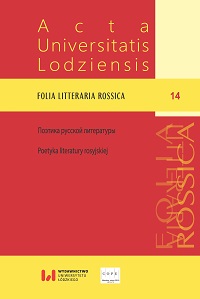The Phenomenon of Silence in Contemporary Russian Fiction (The Novels of Yevgeny Vodolazkin, Lyudmila Ulitskaya and Guzel Yakhina)
DOI:
https://doi.org/10.18778/1427-9681.14.20Keywords:
the anthropology of silence, transcendence, rejection of the postmodern, Laurus, The Kukotsky Enigma, Deti moiAbstract
Silence, a characteristic theme in Russian literature, also plays a significant role in contemporary Russian fiction. Yevgeny Vodolazkin’s Laurus, Lyudmila Ulitskaya’s The Kukotsky Enigma and Guzel Yakhina’s Deti moi [‘My Children’] share several features in their representation of the phenomenon of silence, despite the manifold differences in the plots, the periods in which they are set and in the characters. The first part of the paper explores the components of the three works that establish connections between silence and the conflict, the chronotope and the issue of communication. In each case the plot focuses on the story of a deep but doomed love. It is the protagonist that is responsible for the love’s tragic end and will later try to redeem his or her sin and thereby preserve love in themselves. In all the three works, the reason for the silence of the protagonist – Arseniy, a mediaeval healer, Yelena Kukotskaya, the wife of a gynaecologist from Moscow, and the teacher Bach, a Volga German – is the violence they have had to endure. The spatial attribute of silence is a place on the periphery, which assumes a certain symbolic meaning. In each of the plots, water becomes a very significant spatial element, and it assumes a distinctive mythopoetic function. All three protagonists partake in some mystical experience in which linear time, which plays a dominant role in the depiction of their progression through life, is eliminated. The silent characters also stand out from their environment because of their special connection with language and culture. They replace speech with gestures and writing, and their connection with culture becomes a starting point for certain parallels with the literary tradition. In the second part of the study the common features of the three plots are examined from the point of view of the anthropology of silence and in the perspective of postmodernism. On the basis of this, the author of the paper concludes that none of the three writers are postmodern in the way they describe silence, in terms of either anthropology or aesthetics. Firstly, the image of the human which they revive is characteristic of the Christian and the Cartesian tradition, and alien to the postmodern. Secondly, contrary to the way the function of a literary author is conceptualised in postmodernism, in all the three novels the writers adopt an omniscient position, that is, they embrace the role and responsibility of a centre of sense-making and language.
Downloads
References
Bakhtin, Mikhail. Iz zapisei 1970–71 godov. In: Bakhtin, Mikhail. Estetika slovesnogo tvorchestva. Moskva: Iskusstvo, 1979: 355–381.
Google Scholar
Bart, Roland. Smert avtora. In: Bart, Roland. Izbrannye raboty: Semiotika. Poetika. Moskva: Progress, 1994: 384–391.
Google Scholar
Bogdanov, Konstantin. Ocherki po antropologii molchaniya. Homo Tacens. Sankt-Peterburg: RHGI, 1997.
Google Scholar
Epstein, Mikhail. “Slovo i molchanie v russkoш kulture”. Zvezda. No. 10 (2005): 202–222 http://philosophy.spbu.ru/userfiles/rusphil/Epstein_Slovo_molchanie.pdf
Google Scholar
Kalafatich, Zhuzhanna. Semanticheskaya funktsiya ritoricheskoi konstruksii mise en abyme v proizvedeniyakh Evgeniya Vodolazkina. In: Znakovye imena sovremennoi russkoi literatury. Evgenii Vodolazkin, ed. A. Skotnitskaya, Ya. Svezhii. Kraków: Wydawnictwo Uniwersytetu Jagiellońskiego, 2019: 109–121.
Google Scholar
Krestinskii, Stanislav. “Molchanie kak sredstvo kommunikatsii i ego funktsii v yazykovom diskurse”. Vestnik TvGU. Seriya Filologia, No. 1 (2011): 34–37.
Google Scholar
Lipovetskii, Mark. Anakhronizmy v ‘Lavre Evgeniya’ Vodolazkina, ili Naskolko serezna ‘novaya sereznost’. In: Znakovye imena sovremennoi russkoi literatury. Evgenii Vodolazkin, ed. A. Skotnitskaya, Ya. Svezhii. Kraków: Wydawnictwo Uniwersytetu Jagiellońskiego, 2019: 49–67.
Google Scholar
Loginova, Marina. “Postmodernistskii diskurs molchaniya”. Credo New. No. 2 (2008) http://www.intelros.ru/readroom/credo_new/credo_02_2008/2153-postmodernistskijj-diskurs molchanija.html
Google Scholar
Rozin, Vadim. “Khudozhestvennaya realnost romana Guzel Yakhinoi ‘Deti moi’”. Kultura i Iskusstvo. No. 10 (2018): 79–87 https://e-notabene.ru/pki/article_26710.html
Google Scholar
Szabó, Tünde. Dve Tani: polemika L. Ulitskoi so vzglyadami L. Tolstogo na lyubov. In: Golosa russkoi filologii iz Budapeshta: Literaturovedenie i yazykoznanie na Kafedre russkogo yazyka i literatury Universiteta im. Eötvös Loránd, ed. K. Kroó, É. Bóna. Budapesht: ELTE Eötvös Kiadó, 2018: 221–230.
Google Scholar
Ulitskaya, Lyudmila. Kazus Kukockogo. Moskva: Eksmo, 2006.
Google Scholar
Vodolazkin, Evgenii. Lavr. Moskva: AST, 2015.
Google Scholar
Yakhina, Guzel. Deti moi. Moskva: AST, 2018.
Google Scholar
Yavorski, Mateush. Borba za sokhranenie pamyati: o pisme i rechi v ‘Lavre’ Evgeniya Vodolazkina. In: Znakovye imena sovremennoi russkoi literatury. Evgenii Vodolazkin, ed. A. Skotnitskaya, Ya. Svezhii. Kraków: Wydawnictwo Uniwersytetu Jagiellońskiego, 2019: 215–223.
Google Scholar












